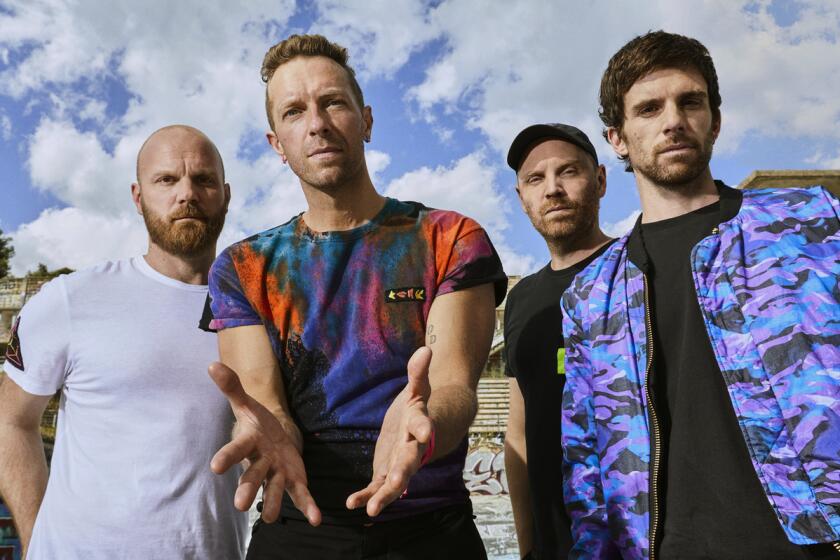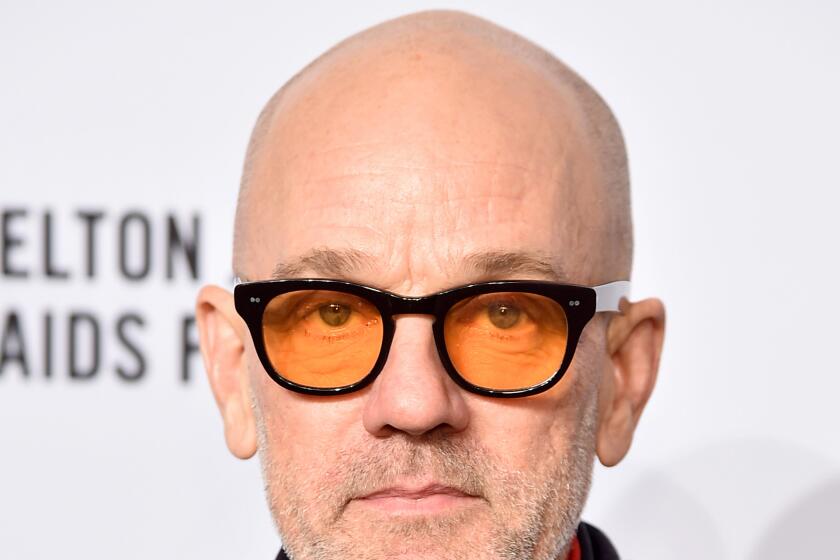It’s still very, very good to be Duran Duran
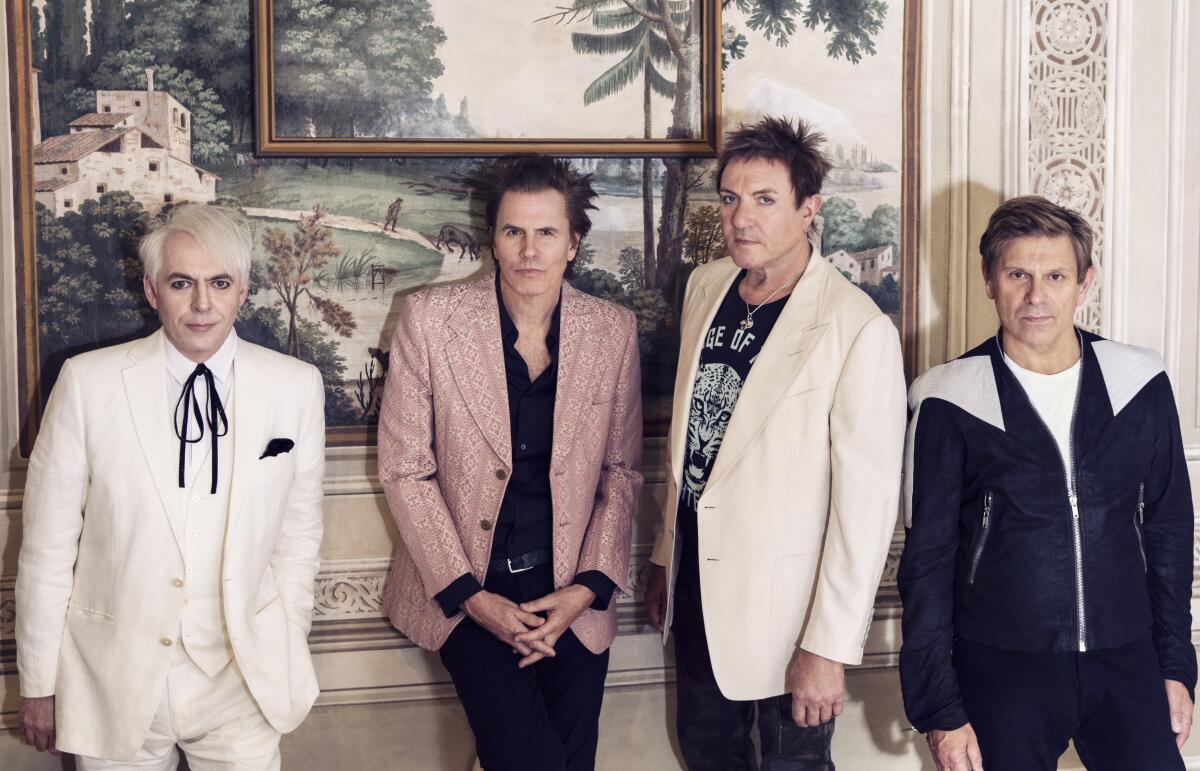
If you had only five minutes and four seconds to show someone what the 1980s were like, all you’d have to do is cue up Duran Duran’s “Rio” music video, a Technicolor blast of cheekbones and excess.
The British pop group filmed it in 1982 on the island of Antigua, where they rented a 70-foot yacht and, wearing pastel silk suits, posed coolly while passing over the Caribbean Sea. “Her name is Rio, and she dances on the sand,” singer Simon Le Bon lip-synced from the bow of the ship.
A new television channel called MTV latched on to this video and made it a centerpiece of its programming. The band members spent only three or four hours onboard, but the image was so powerful that people began to think a typical day for Duran Duran involved a yacht and a model in body paint. They were labeled a “video band,” which carried the connotation of being a fleeting success. “It was quite annoying for a while, that we were pigeonholed like that,” Le Bon says.

Next year will be 40 years since the “Rio” video, and Duran Duran is still around. Unlike a lot of supposed 1980s bands, they had hits well into the ’90s (in the U.S.) and the 2000s (in the U.K.). There’ve been plenty of changes to the lineup of Le Bon, keyboardist Nick Rhodes and the three unrelated Taylors (bassist John, guitarist Andy and drummer Roger), but they’ve never broken up. They’ve made great albums, uneven albums, terrible albums (1995’s “Thank You” included ill-advised versions of Bob Dylan and Public Enemy songs), and a snappy and snazzy new album, “Future Past,” their 15th. For an “’80s band,” they sure have lasted a long time.
In recent years, Duran has amply integrated guest musicians and producers into albums, and the credits on “Future Past” include Giorgio Moroder, Graham Coxon of Blur, Mark Ronson, Tove Lo, British rapper Ivorian Doll and Japanese pop group Chai.
The lineup that recorded “Hungry Like the Wolf,” “Girls on Film,” “Save a Prayer,” “Union of the Snake,” “The Reflex” and “A View to a Kill,” each a huge hit, reassembled in the early 2000s. Guitarist Andy left for a second time in 2006, and the absence of his power chords has left room for a renewed focus on electronic sounds.
Le Bon, who will turn 63 on Oct. 27, and John Taylor, 61, called from a hotel room (a luxury suite, most likely) in Austin, where the band was co-headlining the Austin City Limits festival. Talk turned quickly to Le Bon’s unusual approach to lyrics, COVID-19, David Bowie, plastic trousers and Eurovision. Both maintained a merry disposition throughout the hourlong interview. If the music thing doesn’t work out, Le Bon and Taylor have a bright future as a comedy duo.

Disco great Giorgio Moroder produced two of your new songs, “Beautiful Lies” and “Tonight United.” When I interviewed him a few years ago, he said disdainfully, “Life is too short to work with bands.” Why were you the exception?
Taylor: (laughs) I can understand where he’s coming from. You have to have a strong stomach to work with a band. But we were very deferential and polite with him. He’s probably one of the artists we respect the most.
Le Bon: He loved working with us. I’ve just kind of cast my mind back to the session, and we came up with so many ideas so quickly and he conducted it all.
John, do you need to know what a song is about when you’re recording a bass part? Simon sometimes has what one could call an oblique approach to writing lyrics.
Le Bon: (laughs) I’ll be back in a few moments.
I’ve listened to “Hammerhead” a few times, and I have no idea what that song is about.
Le Bon: Really?
Taylor: Just think Marvel Universe and a sort of vengeful wife.
Le Bon: From China.
Taylor: It’s very cartoon-like, very manga. Look, I don’t think I appreciated a lot of the work Simon was doing in the ’80s. “The Reflex” is an extraordinary lyric and one of the most — what was the word you used? Esoteric?
Oblique.
Taylor: One of the most oblique lyrics to ever reach No. 1. You’d be hard-pressed to get away with a lyric like that today.
“Future Past” is a very emotionally deep album. There’s not a lot of faff on it. Most of the lyrics were written before we went into lockdown. Many of the songs are about emotional crises, or long-term intimacy issues, let’s call them. When we came back after lockdown, I felt that those lyrics, particularly “Invisible,” spoke to the moment, because the last 18 months have really been about intimacy politics.
Le Bon: Well said for a man wearing a pair of duvets on his feet. (laughter) That was very good.

Back in July, the band had a promotional event scheduled in New York that was canceled because of COVID concerns. Have you had COVID?
Le Bon: I have.
Taylor: So have I.
Le Bon: And we were vaccinated as well, right at the very beginning.
Are you back to feeling healthy?
Le Bon: I recovered very quickly.
Taylor: Long COVID is quite a paranoid notion, isn’t it? Every time something doesn’t quite feel right, this little bubble goes, “Is it long COVID?”
Le Bon: “Oh, I don’t feel like going to work today.”
Both at once: Long COVID! (laughs)
The whole point of Coldplay has been voicing the big, cringe-y emotions other musicians are too cool to voice. ‘Music of the Spheres’ is no exception.
The two of you have such an easy rapport when you’re interviewed together. Is there a topic you disagree about?
Le Bon: Maybe we don’t want to answer that question.
Taylor: Maybe we do.
Le Bon: There you go.
Simon, you don’t tweet very often, but you went on a tweeting spree in May during the Eurovision music competition. What is it you love about Eurovision?
Taylor: There’s something we disagree on!
Le Bon: (laughs) Oh, it’s hilarious, and occasionally you get really good songs on it. One of the funniest things is the English obsession with “doing well” at Eurovision. I think this year they were definitely punishing us for Brexit. I got excited about Twitter for a while and then I just felt that I had more important things to do with my creativity. I use it now to promote my radio show on SiriusXM [called “Whooosh!”].
What do you love about doing the show?
Le Bon: It awoke my interest in new music. I came down to breakfast one morning and my daughter Tallulah was listening to BBC Radio 6, which is a sort of alternative music service. I’m like, “I’m gonna put Radio 4 on.” Radio 4 is mostly politics and issues. And she said, “Dad, you call yourself a musician? You don’t even like music, especially new music.”
There’s a syndrome that artists are vulnerable to. It starts off with you getting into a taxi after you’ve spent 12 hours in the studio. The driver says, “What do you want to listen to on the radio?” And you say, “I’ve been listening to music all day. Maybe we’ll have a little bit of quiet.” And that grows and grows until you reach the point where you’re only listening to the music you’re working on, and the stuff that got you into a band in the first place.
Using Spotify and SoundCloud and Bandcamp, I started to find so much incredible music. Artists like LA Priest, J. Bernardt and Arlo Parks. I came across Chai and we put them on the song “More Joy.” I got into London rap, and that’s the reason Ivorian Doll is on “Hammerhead,” to have that really street-y sounding voice.
Simon, you’re not an original member of the band.
Taylor: (laughs) And we remind him of that fact every day.
Le Bon: No, I’m not an original member. It keeps me awake at night!
Do Nick and John ever call you the new guy?
Le Bon: (laughs) I don’t mind. I like anything with the word “new” in the title.
John has made fun of you for wearing pink leopard-print pants when you auditioned to be the new singer. Turnabout’s fair play, what was he wearing?
Le Bon: The picture I have is leather trousers —
Taylor: Plastic!
Le Bon: Plastic trousers, and a cool jacket, which I thought had big shoulder pads, but then I found out it’s just the way he walks. And he had very good hair, I thought.
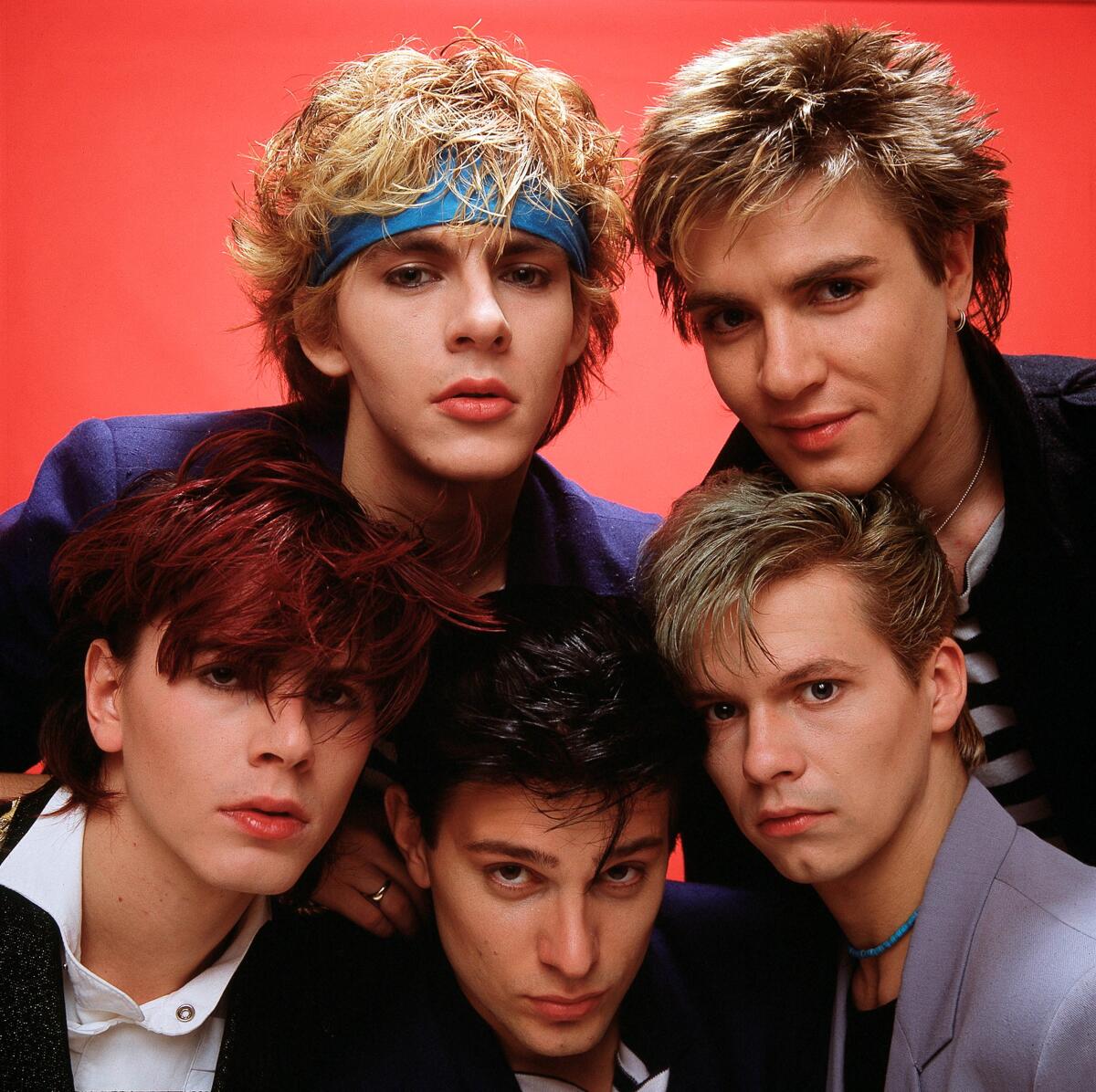
He still does. I also want to ask about finding your voice. When singers begin, they’re more or less imitating a person or a few of them, and then they figure out how to find their own singing voice. What did you sound like at first?
Le Bon: I was trying to imitate David Bowie, I just did a very bad job of it. Well, that’s a little bit flippant. I imitated Bowie, Peter Gabriel and I wanted to sound a bit like Patti Smith as well.
As soon as we started writing our own songs, the songs gave me the voice. When “Planet Earth” was finished and my voice was in the mix, I could hear the power and the emotion in it. That was me, that wasn’t me pretending to be David Bowie.
Taylor: Onstage, we’re sometimes amused by the sincerity with which we play our early hits. Simon will sing a phrase: “Look now! Look all around!” And we all laugh.
Annie Zaleski has a new book about your second album, “Rio.” She describes the press coverage at the start of your career as “skeptical, dismissive and occasionally quite mean.” Does that ring true?
Taylor: I assumed we were going to be an NME [New Musical Express, a weekly music paper] favorite, because that was my bible. That’s where we got our style tips and our attitude. But the NME was entering a sort of nihilistic phase.
Le Bon: Do you remember that [NME] review that started with the headline: “A ripple in a stagnant pool”?
Taylor: (laughs) We’ll never forget that. Not that these things matter to us, but I remember the last line of that review too. “Duran Duran are going to be huge, and they don’t deserve any of it.”
Le Bon: (laughs) I love that.
Taylor: In the second half of the ’80s, people would say, “Are you still playing ‘Girls on Film’ on stage? My God, it’s so old.” And we’d be thinking, “Is it?” Anthony Burgess of “Clockwork Orange” wrote an editorial piece for a Fleet Street paper and said, “Pop music is ephemeral. They’re here today, gone tomorrow. The pop stars need to know that.” And I’m just like, “You c—. Who are you?”
Lifelong Velvet Underground fan Michael Stipe on discovering ‘Loaded’ on an 8-track tape, his friendship with Lou Reed and the pleasures of out-of-tune singing.
You both seem very comfortable with your position in the world of music. Maybe there was a time when you had a chip on your shoulder, but the feeling I get is, you know you’ve won. You’ve won the long game.
Taylor: Right now, we’re in hotel rooms that face flashing billboards saying “The Stones! The Stones! The Stones!” They’re coming to play Austin in a couple of weeks. They’re a polestar, to some degree, for bands like ours. People were saying to them in 1970, “You guys are still going?”
You come to see that maybe you’re being of service by staying together and bringing people together.
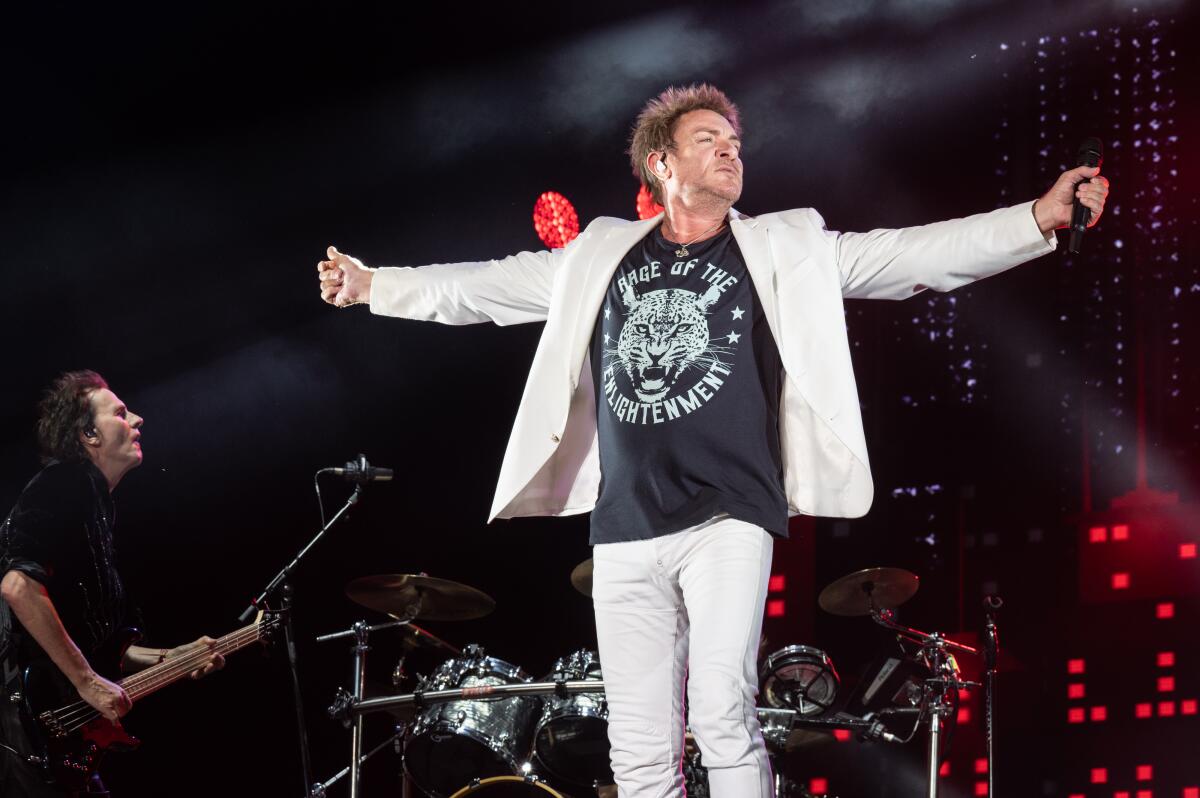
There are so many different factors that go into having longevity as a band. What’s the psychological dynamic that has kept Duran Duran together?
Le Bon: We’ve hammered into each other the fact that we make better music together than as individuals. We’ve rammed that nail well and truly right through each other’s skulls. And it’s true, by the way.
Taylor: The best moment in my life is when the lights go down and our intro music comes on.
Le Bon: I think I have measured my life by shows and tours. Is that sad?
Taylor: No.
Le Bon: I’m a good dad, a good grandfather, a good husband — some of the time. But when somebody says, “What were you doing in so-and-so year?” I think, “That was the ‘Sing Blue Silver’ tour.” Or “that was the ‘Strange Behaviour’ tour.” I don’t think, “That’s when Amber was born” or “That’s when the first grandchild turned up.”
There might be some hurt feelings if your family reads this interview.
Le Bon: No, they already know.
So your next question will be, well, how long are you going to keep going? And I’m going to say, we don’t f— know. We’ll keep going while it’s still fun.
It seems like the reason the band isn’t going to stop is very similar to the reason the band had success.
Taylor: And what is that?
Bloody-mindedness.
Le Bon: Ha! I like that.
More to Read
The biggest entertainment stories
Get our big stories about Hollywood, film, television, music, arts, culture and more right in your inbox as soon as they publish.
You may occasionally receive promotional content from the Los Angeles Times.
